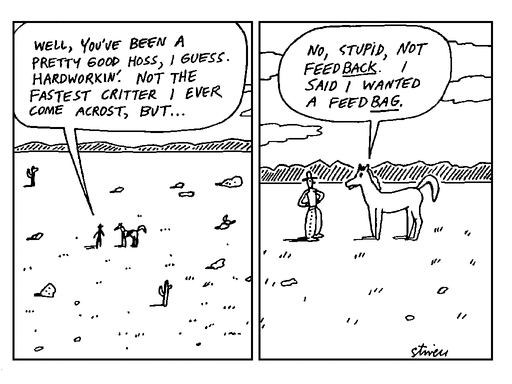The Customer is Wrong

Caption: Latvian punk rock band SŅK album. One way of getting rid of whiny customers.
Not long ago, I wrote about an expression seemingly unique to Latvia: Pats vainīgs! ("It's your own fault!") Pronounced pots-why-nigs, it is often heard on the street after a cyclist crashes into a pedestrian. SNK, the band, used the phrase on its album. Give them a listen.
As every large city has discovered, pedestrians and wheeled contraptions do not mix well.
After you are brushed back or run over, would you not expect the e-scooter driver to apologize?
Not in Latvia.
Instead of an apology the rider's go-to phrase is, "It's your own fault! You got in my way!"
While I experienced this in Latvia, blame-shifting/denying is not unique to nations hung over from decades of totalitarian rule. Back then, passing the buck was one way to survive.
And, such behavior is not limited to scooter/pedestrian interactions.
My 2015 blog, The Kindness of Strangers touches on the "It's your fault" school of customer service and, remarkably, how people help others when least expected.
Eighty kilometers south of the university town of Tartu, Estonia, my wife and I found ourselves stranded in Valga. I last saw our Lux Express bus from about 50 yards back as I ran after it, waving my arms and yelling for it to Stop! (or Stopp! in Estonian.)
No big deal, a sunny day, surely another bus would be along soon? We'll laugh about this in a day or so.
True, but the missed bus sill had my backpack and our suitcase. And if the driver did not drop those items off in Tartu then they'd wind up in St. Petersburg, the bus' end-destination in Putin's Russia.
Imagine how long it would take, if ever, to get those items out of Russia.
So, after recovering our breaths - the absconding bus still visible a quarter mile down the highway - we schemed how to catch it. Perhaps a private car could head it off?
But reason prevailed. The bus driver did not stop when he saw me in his rear view mirrors, so was unlikely to stop for someone waving him down from a speeding car!
Besides, where was I, unlike Bruce Willis, going to commandeer a private car?
Our next thought was to get a message to the bus terminal in Tartu so the agent could get our luggage off. We asked a taxi driver but he did not speak English. He did tell us there was either a train or a bus in a few hours, pointing to a video display on the side of the shared train/bus station building. This was Sunday so not many people were around; the ticket office was closed.
Then we spotted a young red-haired woman on the train platform. She said she spoke English "a little bit." She quickly understood our predicament and willingly googled the bus company's numbers and called, first to Riga (our starting point) and then to Tartu, speaking in rapid Estonian.
A stranger, she helped us. She arranged to have the luggage taken off the bus in Tartu.
"These things happen," she said consolingly. With a wave, our angel got into a waiting car and went out of our lives.
Waiting for the next bus - in the dappled sunshine of a little park in front of the station - I thought about kindness. And that I tell my classes early on about how and why humans cooperate, that our inclination is to help each other. Stuff may get in the way of doing so, but our first reaction is to help.
And, I go on, our willingness to help strangers is why we have survived over the millenia. Undoubtedly, there are humans (aka jerks) with more of the selfish gene (if it exists) and less willing to help but for the most part we have an innate desire to help each other.
Back to our abandonment's being our fault.
The Lux Express company, while sorry to hear of our experience, pretty much responded with pats vainigs. The drivers (there are two on each bus) denied seeing me as I chased them for 100 yards, even when the bus was broad side to me and when I am sure a passenger or two would have said something to the driver.
As I recall Lux offered an e-credit for the Valga to Tartu leg of the trip but no other compensation. I did not bother to ask them to reimburse me for the added expense of our getting from Valga to Tartu.
While we regularly bemoan the deterioration of customer service in the USA, it can be far worse in Europe. But, that said, without Lux Express' failure I would not have experienced an unforgettable act of kindness.
So, while Lux said "Pats vainīgs!" to us, I have to say in return, Thank you, Lux!
***********
Fables offer ancient wisdom about the human condition :

And, for examples of collaborative teamwork in the workplace:

Leading from the Middle, is available at Amazon.
Copyright all text John Lubans 2015 & 2024


 John Lubans - portrait by WSJ
John Lubans - portrait by WSJ